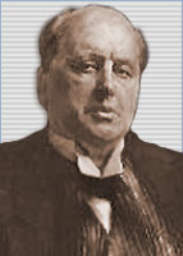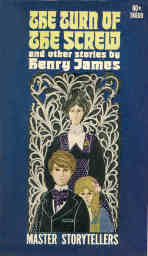These thoughts made it admittedly difficult for the governess to reconcile her thoughts of Miles
having been an injury to others or having been bad in any way. Yet she does not report this to her boss, does
not write to the headmaster for an explanation, and does not ask Miles what happened. Until the very end,
she seems mysteriously content to have such overweening goodness and badness exist in her impression of
Miles.
Add to that a thought she shares with us when she had Miles and Flora in their bed for an hour
one afternoon and was out on her stroll.
[page 27] One of the thoughts that, as I don't in the least shrink now from noting,
used to be with me in these wanderings was that it would be as charming as a
charming story suddenly to meet some one. Some one would stand before me and smile
and approve. I didn't ask more than that I only asked that he should know; and the
only way to be sure he knew would be to see it, and the kind light of it in his handsome
face.
It should come to no one's surprise that is exactly what happened to her when the first ghost, a man,
appears!
[page 27] . . . I stopped short on emerging from one of the plantations and coming
into view of the house. What arrested me on the spot and with a shock much
greater than any vision had allowed for was the sense that imagination had, in a
flash, turned real. He did stand there! but high up, beyond the lawn and at the very
top of the tower to which, on that first morning, little Flora had conducted me.
Even though she had seen a vision, an illusion of her own mind, she rejected it as such and was
convinced of the veracity of the man she saw. She, it seemed, could not be content with the mere illusion
of a man; he had to be real. The vision must be a vagrant trespasser through Bly.
[page 32] That was that, repeatedly, I dipped into my room and locked the door to say
to myself. We had been, collectively, subject to an intrusion; some unscrupulous
traveler, curious in old homes, had made his way in unobserved, enjoyed the prospect
from the best point of view and then stolen out as he came. If he had given me such a
bold hard stare, that was but a part of his indiscretion. The good thing, after all, was
that we should surely see no more of him.
When she finally reveals her encounters with this man to the housekeeper, Mrs. Grose decides on
very little evidence that he is Quint, the master's former valet who was now dead. This active creation of
an identity of the man with the dead valet ratifies and promotes the governess's illusions to the status of a
ghost. This may be considered the second "turn of the screw." The first one was when the governess
wished for some man to appear to her and look at her directly; the second was when Mrs. Grose identifies
the man as a deceased person. But Flora has an actual turn of the screw to perform herself.
The event would be of little consequence were it not for the title of the story and that the governess
had just seen the apparition across the lake as Flora sat at the edge of the lake and was playing with a couple
of pieces of wood. The governess, sure of the reality of the man standing over there, waited breathlessly
for Flora to cry out.
[page 52] Of the positive identity of the apparition I would assure myself as soon as the
small clock. My courage should have ticked out the right second; meanwhile, with an
effort that was already sharp enough, I transferred my eyes straight to little Flora, who,
at the moment, was about ten yards away. My heart had stood still for an instant with
the wonder and terror of the question whether she too would see; and I held my breath
while I waited for what a cry from her, what some sudden innocent sign either of
interest or of alarm, would tell me. I waited, but nothing came; then in the first place
and there is something more dire in this, I feel, than in anything I have to relate
I was determined by a sense that within a minute all spontaneous sounds from her had
dropped; and in the second by the circumstance that also within the minute she had,
in her play, turned her back to the water. This was her attitude when I at last looked
at her looked with the confirmed conviction that we were still, together, under
direct personal notice. She had picked up a small flat piece of wood which happened
to have in it a little hole that had evidently suggested to her the idea of sticking in
another fragment that might figure as a mast and make the thing a boat. This second
morsel, as I watched her, she was very markedly and intently attempting to tighten in
its place. My apprehension of what she was doing sustained me so that after some
seconds I felt I was ready for more. Then I again shifted my eyes I faced what I had
to face.
By Flora's "tightening in place" of the mast instead of screaming in fright, the governess felt that
Flora was "turning the screw" on her! She runs directly to Mrs. Grose to reveal her conclusion, "They know
it's too monstrous: they know, they know!" And she reveals that Flora saw the apparition and gave no
notice of it! Mrs. Grose, who has never read words in a letter or a book, can only accept the governess's
word as an accurate reading of what she saw.
[page 81] She offered her mind to my disclosures as, had I wished to mix a witch's
broth and proposed it with assurance, she would have held out a large clean saucepan.
Mrs. Grose is only a tad skeptical when the governess identifies the apparition of a woman as Miss
Jessel, the governess's predecessor. She asks the governess how she can know it is a woman that she has
never seen, and the governess says, "Ask Flora she's sure!" But neither woman will ask Flora it's
seems so unnecessary. Like a house of cards in a dead still room, the identity of the two apparitions and the
harm they intend the two children is constructed and not even a small breeze can arise to topple the fanciful
construction.
The governess convinces Mrs. Grose that the ghosts are there to suggest danger to the children and
that the Master must take them away to prevent danger to the children. This conversation between her and
Mrs. Grose indicates the Catch-22 of her actually sending the letter. Thus, while the governess will write
the letter, she will allow it to be waylaid on the way to the Master and not arrive.
[page 87, 88] Standing there before me while I kept my seat, she [Mrs. Grose] visibly turning things over.
"Their uncle [the Master] must do the preventing. He must take them away."
"And who's to make him?"
She had been scanning the distance, but she now dropped on me a foolish face. "You, Miss."
"By writing to him that his house is poisoned and his little nephew and niece mad?"
"But if they are, Miss?
"And if I am myself, you meant? That's charming news to be sent him by a person enjoying his
confidence and whose prime understanding was to give him no worry."
It goes on and on this way to resolve, until the very end. Until the snap, as she calls it when Miles
insists that he will get his Uncle to come down if she will not. Then she walks away from Miles at the
church and wanders back to the house when she sinks down at the foot of the stairs and sinks into a
tormented despair. Which she amazingly recalls was the very place she had seen a specter of a woman
earlier sitting one day! It was as though she had seen the very image of herself from the future breaking in
on her. And who knows but what that is exactly what happened to her? We are left with this self-indictment
of herself as the story winds to its horrific conclusion shortly after she recalls the vision on the staircase.
[page 103, 104] My quickness would have to be remarkable, however, and the question
of a conveyance was the great one to settle. Tormented, in the hall, with difficulties and
obstacles, I remember sinking down at the foot of the staircase suddenly collapsing
there on the lowest step and then, with a revulsion, recalling that it was exactly where,
more than a month before, in the darkness of night and just so bowed with evil things,
I had seen the specter of the most horrible of women.
This is a story which can be read on many levels and all of them taken together must somehow
infuse the meaning of the story. A ghost story, two scheming children, or a young woman's twisted
infatuation with a young boy gone awry. The choice is yours, dear Reader a gift of a masterful writer.





